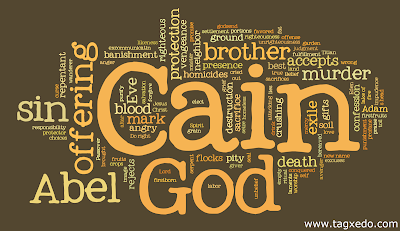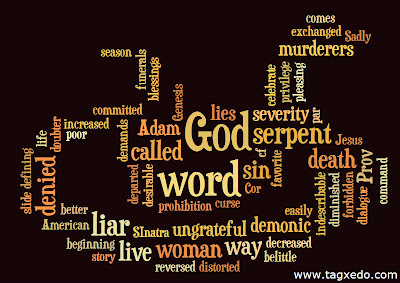 |
| Louis XIV. presenting his sceptre and helmet to Jesus Christ, by Charles Le Brun, 1674 |
Thank God, the Bible story doesn't end just outside the closed gates of Eden. God began laying the groundwork of grace even as be judged the first sin. The serpent had tried to elevate himself God and man. So God's sentence was "cursed are you
above all the livestock and all the wild animals" (Gen 3:14). Now snakes would writhe in shame in the dust. And eventually, a man who ruled with God's own authority would crush the serpent's head (Gen 3:15).
And God graciously sustained his plan for man's life.
I. Restored Rule in the Kingdom of God.
The command to rule detailed a two-part commission:
First, be fruitful, multiply, and fill. Sin frustrated this, but grace restores it. Even after judgment, "Adam named his wife Eve (Heb.
khavvah), because she would become the mother of all the living (Heb.
khay)" (Gen 3:20). The promise that the woman's offspring woudl crush the serpent's head implied this hope; the woman
would bear offspring. God would grant the human race a future rather than impose summary execution. Subsequent genealogies show the family lines of God's people multiplying. In fact, Abraham's offspring would multiply till they were as numerous as stars in the sky or sand grains on the shore (Gen 14:23; 15:5; 22:17; 26:4; 32:12). Indeed, the people who followed Moses out of Egypt and first read this story knew how Egypt came to fear them because of how much they multiplied (Exod 1:7).
Second, subdue and rule. God's redemptive counter-attack began right where the serpent's rebellion had begun, with the woman. He warned the serpent that the offspring of woman would subdue him (Gen 3:15). At first, the use of "seed" (Heb.
zera'; LXX
sperma) of a woman rather than man sounds wrong. But it would indeed be one born of woman, but without a human father, who would gain this victory. "Offspring" is a collective-singular noun, so it often refers to
all of Abraham's descendants. But Genesis 3:15 speaks of an
individual representative: "
he will crush your head," not
they. Paul recognized that this referred to Jesus Christ. He would deliver the head-crushing blow against the serpent for the whole human race (Gen 3:16; 4:4). And those who are in Christ share in this triumph (Rom 16:20).
Even in the Old Testament, God graciously supported man's royal commission. He promised his people that they would subdue the land that he would give them (Gen 26:4) and rule over nations (Gen 49:8-12). This found initial fulfillment in the Davidic dynasty's imperial rule. But even though David was a man after God's own heart (Acts 13:22), he wasn't God's perfect image and likeness. So the rule that he and his descendants exercised only foreshadowed the rule of
the Son of David,
the Son of Man.
Christ Jesus fulfills man's royal commission (Matt 22:4; Mark 12:36; 1 Cor 15:25-27; Eph 1:22). And if we are "in Christ," this commission finds fulfillment in us. Even now, we bind and loose (Matt 16:19; 18:18) and have the authority to trample on the serpent (Luke 10:19). It's because we "have been given fullness in Christ, who is the head over every power and authority" (Col 2:10). And when we're finally renewed in God's image and likeness, we'll reign with Christ in the heavenly council (Rev 3:21; 20:4). We'll judge even angels (1 Cor 6:2-3).
II. Restored Rest in the Kingdom of God
Even after the fall, God graciously sustained a measure of rest for his people. God promised freed slaves leaving Egypt that they would have rest from their enemies (Josh 1:13-15; 11:20; 14:15; 21:44; 22:4; 23:1). He gave them judges, who gave them periodic rest (Judg 3:11, 30; 5:31; 8:28). They hoped for a king to give them a lasting rest (Judg 9:6, 8, 10, 12, 14-18; 17:6; 18:1; 19:1; 21:25). So he gave them king David (2 Sam 7:1, 8-11). Even when the exile sent them out of the land, God would promise a time when they would again experience Sabbath (Jer 17:19-26; Ezek 46:3-12). Even foreigners could experience that rest by following the LORD (Isa 56:6-8).
When Jesus came, he came fulfilling Sabbath. So "We who have believed enter that rest" (Heb 4:3). Let's do our best to enter heaven's eternal rest (Heb 4:9, 11).
III. Restored Fellowship in Paradise
Even after judging the man and woman, he showed them grace. He gave them skins to replace their pathetic coverings. This implied God's intent to revive the fellowship that sin broke. Even though the story lacks any explicit sacrificial language, we can see a precursor to divine atonement here. The priests, who received the skins of sacrificial animals (Lev 7:8), would almost certainly have read this story with atonement in mind.
This foreshadowed the promise of robes of righteousness, which the fine linen in John's visions symbolize (Zech 3:4-5; Matt 22:11; Luke 15:22; Rev 19:8). That all looks forward to when believers will be clothed with the righteousness of Christ (Gal 3:27). God covers the shame of sin. He wants a relationship with us. In turn, he gives us a ministry of reconciliation, to spread that relation throughout all mankind (2 Cor 5:18).
And what of the guarded gate that blocked the way back to the tree of life? In the Old Testament, a curtain kept nearly everyone out of the holiest place nearly all the time. But by God's grace, the high priest could enter annually on the Day of Atonement (Lev 16; 23:26-32). But now we shout, "Blessed is he would was pierced and so removed the sword from the entry to paradise."[1] Jesus removed it when God tore the temple curtain (Matt 27:51). That's the argument of Hebrews six through ten. and in the end, Jesus Christ leads us forward into the new paradise, and back to the tree of life. John said,
Then the angel showed me the river of the water of life, as clear as crystal, flowing from the throne of God and of the Lamb down the middle of the great street of the city. On each side of the river stood the tree of life, bearing twelve crops of fruit, yielding its fruit every month. And the leaves of the tree are for the healing of the nations. No longer will there be any curse. The throne of God and of the Lamb will be in the city, and his servants will serve him. (Rev 22:1-3)
This is paradise regain, perfect fellowship with God regained, service to God perfected. This is life eternal.
In this Advent season, thank God that his Son as Last Adam, to restore all that First Adam ruined in rebellion. And follow the Son, who is the "pioneer and perfecter of our faith" (Heb 12:2 NET). The blessed one born King of the Jews is King of kings and Lord of lords. Let him rule in your heart this Christmas.
________________
1. Ephrem the Syrian, Hymns on Pardise, 2.1; quoted in Andrew Louth, ed., Genesis 1-11, Ancient Christian Commentary on Scripture: Old Testament, general ed., Thomas C. Oden (Downers Grove, Ill.: InterVarsity, 2001), 102.
 Yet sin brought death to humanity--even the line that worshipped God (Gen 2:7; Rom 5:12-21; 6:23). From Adam on, a man was born, grew up, sired children, and "lived" a certain number of years; "then he died" (Gen 5:5, 8, 11, 14, 17, 20, 27, 31). But when we come to Enoch, the seven from Adam in this line, we read a different story:
Yet sin brought death to humanity--even the line that worshipped God (Gen 2:7; Rom 5:12-21; 6:23). From Adam on, a man was born, grew up, sired children, and "lived" a certain number of years; "then he died" (Gen 5:5, 8, 11, 14, 17, 20, 27, 31). But when we come to Enoch, the seven from Adam in this line, we read a different story:


























